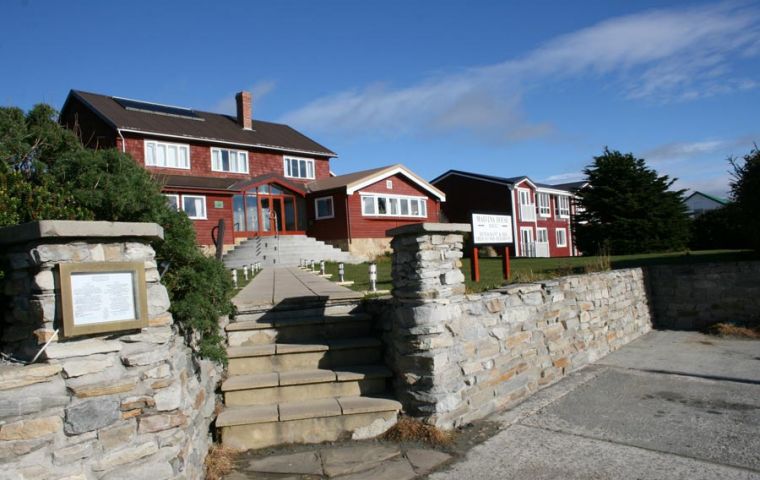MercoPress. South Atlantic News Agency
Falklands’ Land-Based Tourism Down 10% in 2009/2010 with 16% Britons Less
 Malvina House Hotel with new extension to the right
Malvina House Hotel with new extension to the right Falkland Islands land-based receptive tourist operators estimate that this season there was a 10% contraction in in-bound numbers compared with 2008/09. However bookings for 2010/2011 are back at good season levels, according to a report in the latest edition of the Islands weekly Penguin News.
Although the land-based tourist season is still to some extent continuing, “in-bound numbers this season have experienced a 10% drop”, Sally Ellis who deals with the receptive tourism side of International Tours and Travel (ITT) told Penguin News.
However, this was slightly better than they might have expected according to the former General Manager of the Tourist Board, Jake Downing. According to Jake’s research, Britons—who form the biggest single market for land arrivals in the Falklands—took 16% fewer holidays than in 2008. Mainly independent travellers, the age distribution of ITT’s clients remains much the same as in previous years, with the majority being aged between 55 and 74 years.
Mrs. Ellis reports that while Britain continues to provide most clients, this season saw an increase in the number of North American visitors, equalling the number of visitors from Europe.
Uptake on the Ministry of Defence (MoD) flights is minimal, with the LAN (NYSE: LFL) route proving much more popular, says Mrs. Ellis who blames the very short lead-in time for booking MoD flights as a negative factor for tourists, who tend to plan their trips nine to 12 months in advance. A similar preference is shown by clients of the Falklands other main receptive tourism agency, Stanley Services, who report that 72% of their clients arrived using the LAN connection.
Tourism Manager Arlette Bloomfield feels this indicates that the Royal Air Force (RAF) price schedule is having a major effect on their UK-based clients. Mrs. Bloomfield reports that the 2009/10 season went well with passenger numbers some 12% up on the previous season and January particularly busy. Problems Stanley Services experienced were mainly due to Falkland Islands Government Air Service (FIGAS) operations, the Falklands’ government funded domestic air link.
Complaints were received regarding the late departures from Stanley, the transit through Stanley when travelling from north to south and vice versa, and general information given on flight timings. There were too few shuttle seats available before charter aircraft were required, representing an extra expensive cost to clients, added Mrs. Bloomfield, who says that her regular repeat clients found that the new shuttle service was not as user friendly as the previous taxi service, which gave them more time at island destinations and less spent waiting in airports.
Another major problem for receptive agencies is that bookings for next season cannot be confirmed due to FIGAS not yet confirming seat availability. Difficulties are also caused, says Mrs. Bloomfield, by certain island locations not being able to confirm whether they will be open, or only open on certain days during the season.
Lodging occupancy levels in Stanley, which might have been expected to suffer from a drop in tourist numbers, have been bolstered this season by the arrival of oil contractors, de-miners and other essentially business visitors.
ITT are now receiving bookings for the 2010/11 season at 2008/9 season levels, which indicates a return of confidence, but may also hold a warning of increased pressure on Stanley accommodation.
Carl Stroud, manager of the newly expanded Malvina House Hotel—which has enjoyed a busy season lodging oil men, fishermen, government visitors and the world’s media—said that tourism occupancy had been down. He feared that if tourism picked up again to former levels and the level of business visitors was maintained, his 37 double rooms might not prove to be enough to cope with demand.
Speaking for ITT, Mrs. Ellis said: “I don’t think we have reached saturation point for the current accommodations yet, other than at a couple of peak periods, but complacency is always dangerous.”
Penguin News


Top Comments
Disclaimer & comment rules-

-

Read all commentsAll silent on the western front? Intriguing, it seems when Mercopress deals with everyday life of the islands the Malvinist thugs are distinctly absent.
May 06th, 2010 - 09:05 am 0Could it just be their arguments are so incredibly weak when the Falklanders are directly factored into the equation.
Doubtless Agent Parrot might construct an opinion or two to back this statement up.
Well Rhaurie, perhaps it is difficult for them as, when they see just how British the Falklands are, and how they in no way look Argentine, they have the wind taken out of their sails.
May 07th, 2010 - 08:50 am 0Commenting for this story is now closed.
If you have a Facebook account, become a fan and comment on our Facebook Page!